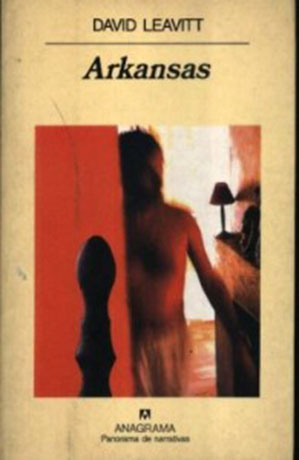Arkansas: Three Novellas
by David Leavitt
Published by Houghton Mifflin
Published April 3, 1997
Literature (anthology)
198 pgs. • Find on Amazon.com
Reviewed by Stephen O. Murray
October 21, 1998.
David Leavitt’s stories have struck me as highly polished and little more.
I admired his first novel, The Lost Language of Cranes, a conventional narrative about the painful dissolution of a long-running marriage when father and son come out. No one seems to have liked Equal Affections, and When England Sleeps (which I haven’t read) is primarily known for cannibalizing Stephen Spender’s memoirs. Thus, my expectations for Arkansas were not particularly high.
I couldn’t help knowing the subject matter of “The Term Paper Artist” after a well-publicized decision not to print it in Esquire. Even though I knew what to expect (a blocked writer composing term papers for male UCLA students in exchange for letting him suck their cocks) I found it more daring, both in narrative and explicitness—that is, explicitness about abjection. It is not very sexually graphic.
I hadn’t realized that “artist” in the title was more than a metaphor. Submitted under other names, the papers are the best work that the novella’s narrator, who is also named David Leavitt, has done, better than the work published under his own name.
Still, ultimately, he is a failure in writing term papers, too, unable to make one of them fit with the character and work of the most conscientious of his customers, a Mormon whose homoerotic desires he unleashes. I wanted to hear about getting fucked in the jeep of one of his customers. Most let him suck their cocks, which seems to me not a very high price for original papers that earned As for the mostly affluent and lazy students whose names were on the papers. David doesn’t want to fuck them, which is fortunate, since that’s a price the straight boys balk at (making sure that that isn’t part of the contract).
 The mix of unsavory activity by David Leavitt (the character) and the reputation for reticence of David Leavitt (the writer) gives frisson, though what is most interesting to me is writing for fame vs. ghostwriting for pleasures (including sex, but doesn’t fame open avenues to sex, too?) And the metanarrative about memory and fiction is far better than the lame justifications Leavitt offered in the case of borrowing Spender’s memories! That David Leavitt was sued by an elderly English poet is most certainly fact, but one may wonder if his own reported sexual acts were any more reportorial than those he imagined for Sir Stephen.
The mix of unsavory activity by David Leavitt (the character) and the reputation for reticence of David Leavitt (the writer) gives frisson, though what is most interesting to me is writing for fame vs. ghostwriting for pleasures (including sex, but doesn’t fame open avenues to sex, too?) And the metanarrative about memory and fiction is far better than the lame justifications Leavitt offered in the case of borrowing Spender’s memories! That David Leavitt was sued by an elderly English poet is most certainly fact, but one may wonder if his own reported sexual acts were any more reportorial than those he imagined for Sir Stephen.
Leavitt’s alter ego eventually gets the man in “Wooden Anniversary,” too. I don’t really believe Lizzie recording in detail Nathan’s hallucination by the Arno, but the choice of someone who does not understand why Celia is so upset (when Nathan triumphs again with the man she knows he wants and thinks he will not get as revenge for not wanting her 17 years earlier in college) is good. Good local color, too.
“Wooden Anniversary” is more than a little sadistic in that it is hard not to read Nathan as David. It also provides another instance of pretending not to know (the will not to know) doubly imagined Italian parents (p. 109). Here it is Celia who is masochistic (or at least ready for abjection) and not the Leavitt stand-in. Nathan may be cracking up, but mostly he is bored and inconsiderate (of what Lizzie also fails to grasp until told, “So how could I know?” He might argue, “I didn’t know I was competing with Celia…”)
There’s more self-flagellation (about being unproductive and obsessed with phone sex and video porn) in the last novella, “Saturn Street.” It is a story in which the narrator doesn’t get the man. Another AIDS service organization volunteer get the wreck of a hunk who was a carpenter and made at least one porno flick (so that David does get to see what his cock is like). I don’t know what the point of this story is.
He several times mentions that he “doesn’t absorb details well; he also repeats Oscar Wilde’s assertion that conversation is the basis of successful marriages. And the narrators make daily visits to Circus of Books on Santa Monica Blvd. to peruse and purchase porn. And the narrators are portentously, though not fatally, attracted to heedless but sweet and mostly nonjudgemental straight male sex objects. . .
21 October 1998, later posted on epinions
©1999, 2016


